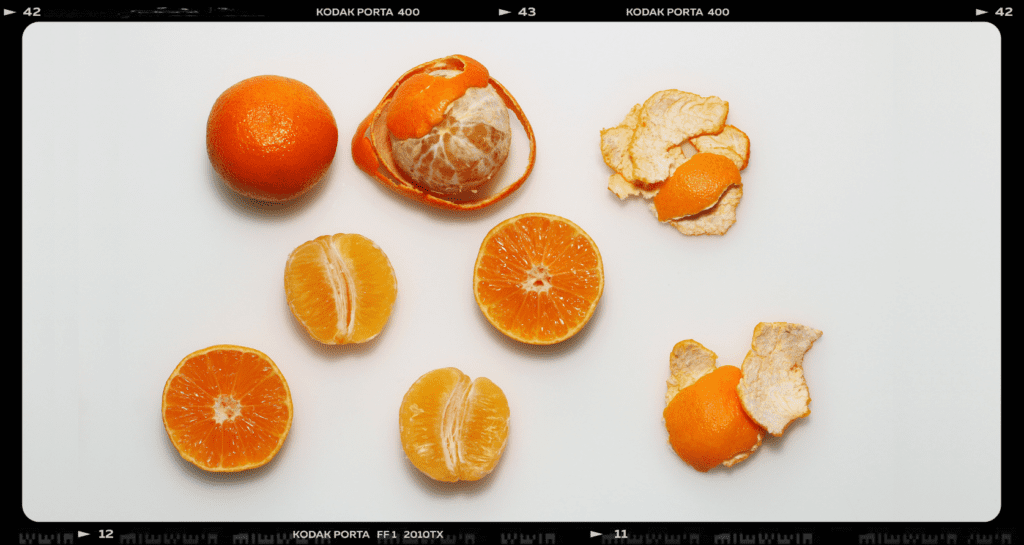
Why Consistency in Podcast Format and Style Is Key
Stop! Don’t leave, you are at the right blog. I know right about now you are scratching your head, looking at the photo, and thinking to yourself. “Huh… How does… I thought this was… Wait, did I eat breakfast?” Trust me you are where you intended to be. Welcome to the fourth section of pre-podcast production. We are nearly through building the first pillar in The Four Pillars of Podcasting. Great job! Now close your eyes.
Picture an orange. You are holding it in your hands. You know the feel of its dimpled peel. Your nose knows the fresh, tangy scent. Your mouth waters at the anticipation of its sweet juice. And, your body thrives in absorbing its rich vitamin C. It’s the perfect snack and you’ve been waiting to eat it all day. You dig into its peel and tear away the fruited flesh. You know that within, it holds a multitude of perfectly formed sections formed by mother nature. You open your eyes and instead of perfectly portioned sections of orangey goodness, you have several sections of orange and one glop of green, slippery, smushed avocado.
A little disconcerting, isn’t it? Remember that feeling. This is the reason, when creating a podcast, to choose the correct podcast format for your niche and be consistent within that format. The last thing your audience wants is a palm full of globs of green mush.
The Power and Comfort in Consistency
Like your favorite, old sweater, your favorite food, or your perfect weather day, podcast consistency can be comforting. We see this in all areas of life, be it music, yoga, or our daily routine. It creates security in knowing. Listeners come to expect a certain amount of consistency when they return for new episodes for your show.
Like knowing your niche, and keeping your topics within that niche, you want to choose a podcast format that will stay in its own parameters. Now that isn’t to say that you can’t add, or take away at times. Even your favorite old sweater may need a new stitch or two to keep it functioning for your needs.
Podcasts are no different, sometimes they need a new stitch or two, while maintaining the original “sweater.” Think back to how you viewed that orange before it contained something fully unexpected. You felt secure in your knowledge of the outcome, and you trusted that an orange is going to be an orange.
Now, if I had told you beforehand that there was going to be guacamole inside, sure you would have thought I was insane, but you would have expected something different. The comfort in your knowledge would have still existed, but with a bit of anticipation. Which is totally different from the sudden explained shock of change to what you already knew.

The Three R’s of Consistency
Hey, guess what? You hate oranges. Okay, instead of picturing an orange, remember these three words:
- Reliability
- Relevance
- Reputation
Consistency in your podcast format will facilitate these three R’s. Your audience will come to rely on your show and how it runs. This consistency will build trust between you and your audience, and in turn, make them feel secure in the message you are putting out there. Being consistent, not only in your podcast format, but also in your schedule and publishing, your recording, and even your editing will help to keep your podcast’s relevance. You may be saying, “My podcast is about crime in the 1800’s. How is that relevant?”
While you want your podcast episodes to be reliable to the topic you are discussing, you also want your episodes to have relevance. In turn, this provides you with the ability to foster quality connections with your target audience through consistency. And last but not least, the word that will affect you more than the others, is reputation. By building trust, and connecting with your listeners, you are forming a reputation for your podcast and yourself. You will always want to keep that reputation a positive one.
What Is a Podcast Format?
I’m not trying to be simplistic, but the purpose of this blog is giving you help with formatting. If you have never created a podcast before, it is plausible that you don’t know what is meant by “podcast format.” That is perfectly fine. We are building this together. At its most basic term, format simply means “to arrange.”
For our purposes, a more detailed definition would be, to map out an organized structure of material. The material being the information you intend to put out during any given episode. The structure would breakdown to the segments of the episode, and the mapping out would be how you will present the material in each segment, within each episode. Now you have an orange.
Six Podcast Format Types to Consider
When it comes to your podcast format and style, consider choosing one of these six popular types. As we have already discussed, it is okay to occasionally mix one in, but never unexpectedly. Always try to give your listeners a heads up, if you are going to change your format. End of show announcements, or connecting a segment with a future segment by discussing it, can help aid in your podcast endeavors. Whether you are a novice or an experienced podcaster, these six popular formats will not disappoint:
- Interview style: The host conducts a Q&A discussion with an individual.
- Roundtable/panel/conversational: A group of people have a discussion on a related topic.
- Educational/instructional: An individual educates on a skill.
- Solo/monologue: A single host talks on their topic, on their own, the entire episode.
- Narrative nonfiction storytelling: A single person talks of a specific real story cut together with interviews, and sounds bites to shape a story and add pertinent information.
- Narrative fiction storytelling: This one is the easiest, thought of like a TV show.
For more in depth descriptions of these formats, you can easily access The Four Pillars of Podcasting. No matter which format you choose, be certain it connects to your niche. If you have a variety show type podcast planned, you don’t want to use the Interview format. Nor do you want to put your podcast in the format of a Roundtable when it’s instructional. That would be confusing.
Like the first pillar building blocks that came before this one, take your time to decide what will work best for your podcast. If you use strong materials in each step, your podcast will withstand the turning tides of the podcast world, and bring your audience along with you on a smooth sailing, enjoyable, and consistent ride.
